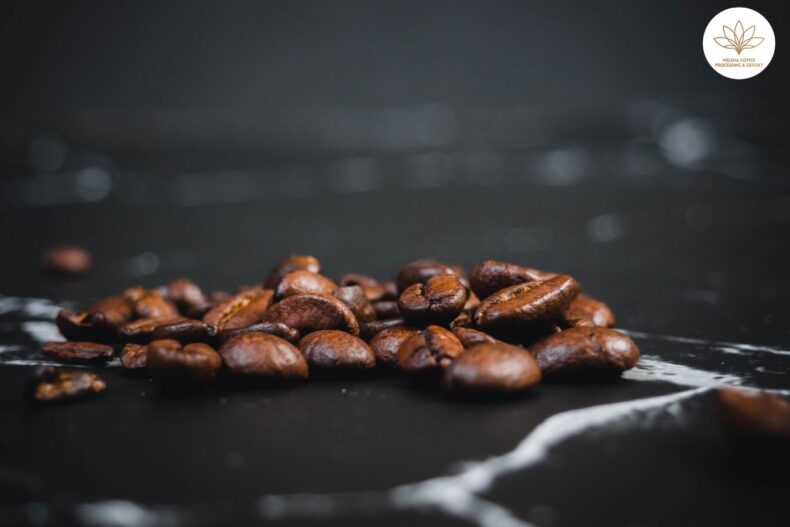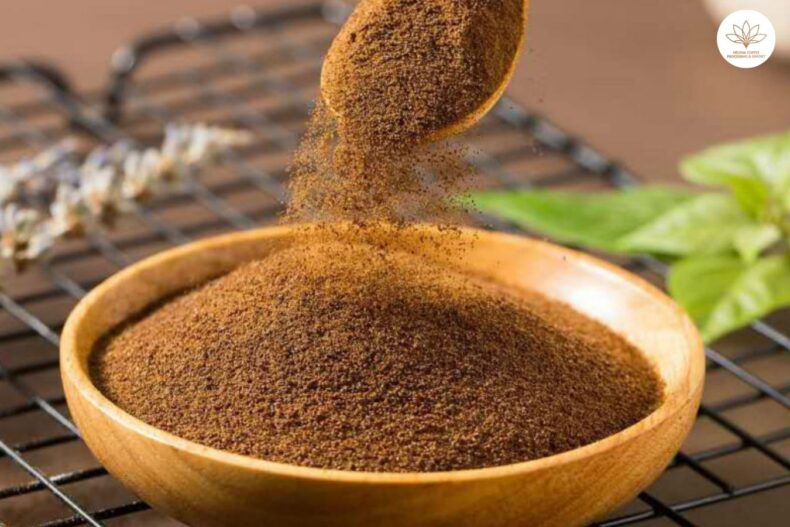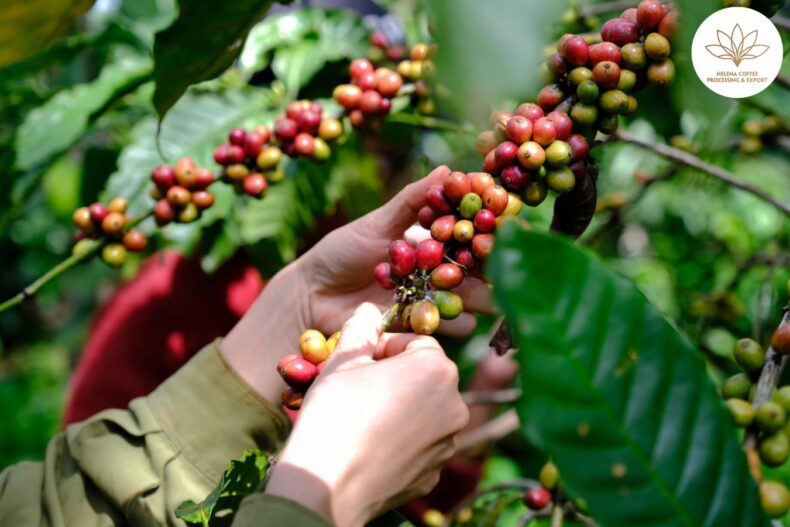
Coffee is one of the most popular beverages in the world, with different types of coffee beans offering unique flavors and caffeine content. Robusta coffee, in particular, is known for its strong taste and high caffeine content, making it a popular choice among coffee lovers. This article will explore everything you need about Robusta coffee caffeine content.
Whether you like a steaming cup of coffee every morning or merely share a home with someone who does, you’ve probably heard of the various coffee brands and varieties available. You may discover Robusta coffee among these possibilities when selecting a coffee to brew at home. There are supporters of Robusta and its high caffeine concentration, even though many people believe it is less popular than the other option, Arabica.
Let’s discover more about this coffee, how it stacks up against the competition, and which brands you could find it in. The caffeine content in a Robusta coffee bean is 2.2%, roughly double that of an Arabica coffee bean. An 8-ounce cup of Robusta coffee contains up to 265 milligrams of caffeine.
What is Robusta Coffee?
Robusta coffee, scientifically known as Coffea canephora, is a coffee plant native to sub-Saharan Africa. Robusta coffee is known for its hardiness and ability to grow in harsh conditions, making it more resistant to pests and diseases than other coffee plants. Regarding taste, Robusta coffee is known for its robust and bold flavor with hints of chocolate and nutty notes.
The sub-Saharan areas of Africa are where robusta coffee first appeared. Along with Arabica, Coffea canephora is one of the two main species of the coffee plant and is where it gets its name. Since it was discovered in the 1800s, the Robusta plant has been a significant player in the coffee industry, accounting for up to 40% of all coffee plants cultivated globally.
Due to the different growth circumstances required for each kind, Robusta coffee is considered of inferior to Arabica coffee. Robusta doesn’t require the same conditions as Arabica, cultivated in areas with higher elevations and more rain. Robusta, sometimes called coffee produced in the sun, may be grown without the same attention as Arabica in most climates. However, this has the potential to impact bean flavor, which is why more people favor Arabica.
Robusta Coffee Caffeine Content
The amount of caffeine in Arabica and Robusta coffee is another significant distinction. About 2.2% of a Robusta bean is caffeine. A single Arabica bean has just 1.2% caffeine. Given the differences in the beans, it seems sense that an 8-ounce cup of Robusta coffee would contain a lot of caffeine. The quantity of caffeine in a cup of Robusta coffee is 265 mg, which is quite a lot.
It might be challenging to determine the precise caffeine concentration in Robusta coffee. The growth circumstances, the brewing process, and, notably, the bean quality can all impact the caffeine concentration. But because the two types of coffee have such pronounced differences, you’ll find that any cup of Robusta contains roughly 83% more caffeine than an equivalent cup of Arabica. Even compared to some commercial energy drinks, Robusta coffee has the same amount of caffeine.
Here is a comparison of Robusta to some highly caffeinated drinks.
| Bang Energy | 300 mg of caffeine |
| Robusta Coffee | 265 mg of caffeine |
| Starbucks Triple Shot Energy | 225 mg of caffeine |
| Monster Energy | 160 mg of caffeine |
| Red Bull | 80 mg of caffeine |
How Much Caffeine Does Robusta Coffee Contain?
Robusta coffee contains more caffeine than other coffee species, including Arabica coffee, the most commonly consumed coffee in the world. On average, Robusta coffee contains around 2.7% caffeine, while Arabica coffee contains only 1.5%. This means that Robusta coffee has almost twice the amount of caffeine as Arabica coffee.
Why Does Robusta Coffee Contain More Caffeine?
The main reason for Robusta coffee’s higher caffeine content is due to its genetics. Robusta coffee plants naturally contain more caffeine than other coffee species, which is believed to have evolved as a natural defense mechanism against pests and insects. Robusta coffee plants are typically grown in lower-altitude areas, leading to a slower maturation process and higher caffeine content.
How Does the Roasting Process Affect Robusta Coffee Caffeine Content?
The roasting process can also impact Robusta coffee’s caffeine content. Generally, the longer the roasting process, the lower the caffeine content in coffee. However, this can vary depending on the specific roasting method and temperature. In general, darker roasts will have lower caffeine content than lighter roasts.
How Does the Brewing Process Affect Robusta Coffee Caffeine Content?
The brewing process can also impact the caffeine content in coffee. Generally, brewing methods that use hotter water and longer brewing times will extract more caffeine from the coffee grounds, resulting in higher caffeine content in the final cup. For example, espresso and French press extract more caffeine than drip coffee.
Health Benefits and Risks of Robusta Coffee Caffeine Content
While caffeine can provide several health benefits, such as increased alertness and improved cognitive function, it can also have adverse effects when consumed excessively. Drinking too much caffeine can lead to symptoms such as headaches, insomnia, and increased heart rate. It’s important to note that the safe daily caffeine intake can vary from person to person and depends on several factors, such as age, weight, and overall health.
Robusta Coffee
How to Enjoy Robusta Coffee
If you’re a coffee lover looking to try Robusta coffee, there are several ways to enjoy it. Robusta coffee is commonly used in espresso blends and is often found in coffee shops and cafes. Additionally, you can purchase Robusta coffee beans and brew them at home using various methods, such as French press or drip coffee makers. It’s important to note that Robusta coffee can have a strong, bitter taste, so it may be best to experiment with different brewing methods and ratios to find your preferred flavor profile.
Health Benefits of Robusta Coffee
- It contains antioxidants that can help protect against chronic diseases such as cancer and diabetes.
- It can boost cognitive function and improve alertness due to its high caffeine content.
- It may lower the risk of liver disease and improve liver function.
- It can help reduce the risk of heart disease and stroke.
- It may have anti-inflammatory properties that can reduce the risk of certain diseases.
Risks of Consuming Too Much Caffeine
The Risk of Excessive Caffeine
We are all aware that drinking too much coffee can harm our health. When drinking Robusta coffee or coffee brands made from these beans, keep this in mind. Caffeine intake should not exceed 400 mg daily, although strong coffee consumers frequently do. If you drink too much caffeine, you can have problems if you have caffeine sensitivity. Because of this, you should constantly be conscious of how much is in your morning cups.
The caffeine content of three of the most well-known coffee brands made using Robusta beans is shown below.
- It can cause restlessness, nervousness, and increased heart rate.
- May lead to insomnia and disrupt sleep patterns.
- It can cause digestive issues such as acid reflux, nausea, and diarrhea.
- This may lead to anxiety and panic attacks in some individuals.
- It can cause dehydration and increase blood pressure in some people.
| Black Label Devil Mountain Coffee (12 fl. oz.) | 1555 mg of caffeine |
| Very Strong Coffee (12 fl. oz.) | 1350 mg of caffeine |
| Devil’s Brew (12 fl. oz.) | 1325 mg of caffeine |
How to Choose and Store Robusta Coffee Beans
- Look for fresh Robusta coffee beans roasted within the last few weeks.
- Consider purchasing single-origin Robusta coffee for a more unique and authentic flavor profile.
- Store Robusta coffee beans in an airtight container in a cool, dark place away from moisture and sunlight.
- Avoid storing Robusta coffee beans in the refrigerator or freezer, as this can cause moisture buildup and affect the flavor.
Popular Brands of Robusta Coffee
- Lavazza: An Italian coffee brand that offers a range of Robusta coffee blends.
- Vietnamese Coffee: Known for its firm Robusta coffee beans, it is a popular choice among coffee enthusiasts.
- Death Wish Coffee: A US-based coffee company specializing in high-caffeine Robusta coffee blends.
- Kicking Horse Coffee: A Canadian coffee company that offers a variety of Robusta coffee blends.
Robusta Coffee vs. Arabica Coffee: Taste Comparison
- Robusta coffee is known for its robust and bold flavor with hints of chocolate and nutty notes.
- Arabica coffee is known for its more delicate, floral flavor with hints of fruit and sweetness.
- Robusta coffee is often described as more bitter and earthy than Arabica coffee.
- Arabica coffee is generally considered higher quality and more expensive than Robusta coffee.
Best Brewing Methods for Robusta Coffee
- Espresso: Robusta coffee is commonly used in espresso blends and can provide a rich and bold flavor profile.
- French Press: The French press method can extract more caffeine from the coffee grounds, producing higher caffeine content in the final cup.
- Cold Brew: Coffee made with Robusta beans can provide a smooth and bold flavor profile with lower acidity than hot-brewed coffee.
How to Make Robusta Coffee at Home
- Grind Robusta coffee beans using a coffee grinder.
- Choose a brewing method, such as drip coffee, French press, or espresso.
- Use the appropriate amount of coffee and water for the chosen brewing method.
- Experiment with different brewing ratios and methods to find your preferred flavor profile.
Robusta Coffee in Different Countries
- Vietnam: Known for its solid and flavorful Robusta coffee, often brewed with sweetened condensed milk.
- Italy: Robusta coffee is commonly used in espresso blends and is a staple in Italian culture.
- Brazil: The largest producer of Robusta coffee in the world, Brazil produces various Robusta blends for domestic and international consumption.
- Uganda: Robusta coffee is an essential crop for Ugandan farmers, with the majority of production being sold for export.
Conclusion
Robusta coffee is a unique and flavorful type of coffee renowned for its high caffeine content. While it may not be as well-known or highly regarded as Arabica coffee, Robusta coffee has its distinct flavor profile and can be enjoyed in various ways.
It’s essential to be aware of the potential health risks of consuming too much caffeine and to enjoy Robusta coffee in moderation. By choosing high-quality beans, experimenting with different brewing methods, and being mindful of the sustainability of coffee production, you can fully appreciate the unique qualities of Robusta coffee.
FAQs
-
- Is Robusta coffee stronger than Arabica coffee? Yes, Robusta coffee has a higher caffeine content than Arabica coffee, giving it a more robust and bold flavor.
- How much caffeine is in a cup of Robusta coffee? The caffeine content in Robusta coffee can vary depending on several factors, such as growing conditions, roasting process, and brewing method. On average, Robusta coffee contains around 2.7% caffeine.
- Can Robusta coffee be used in espresso machines? Robusta coffee is commonly used in espresso blends and can provide a rich and bold flavor profile.
- Is it safe to drink Robusta coffee every day? The safe daily caffeine intake can vary from person to person and depends on several factors, such as age, weight, and overall health. It’s essential to be mindful of your caffeine intake and to enjoy Robusta coffee in moderation.
- How do I know if the Robusta coffee I buy is ethically sourced? Look for certifications such as Fair Trade or Rainforest Alliance, which ensure that coffee is produced sustainably and ethically. Additionally, you can research the coffee company and its sourcing practices to ensure they are transparent and honest in their production processes.


